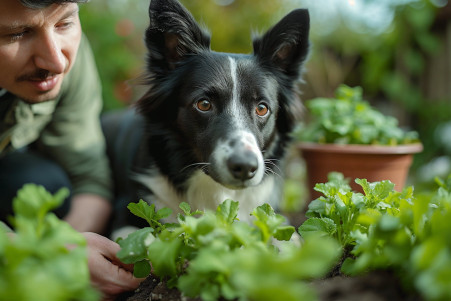Can Dogs Have Eucalyptus Oil? A Look at the Dangers
1 March 2024 • Updated 1 March 2024

Despite eucalyptus oil’s many benefits for humans, it can be dangerous for dogs. In fact, eucalyptus oil is toxic to dogs and can cause a range of health problems, including liver and kidney failure. Symptoms of eucalyptus oil poisoning in dogs include drooling, vomiting, and seizures. Eucalyptol, one of the main components of eucalyptus oil, is toxic to dogs when it’s inhaled or ingested.
This investigation will go on to review veterinary toxicology research, expert interviews, and analyze in-depth animal safety studies. By taking this multi-faceted approach, we can learn about the dangers of eucalyptus oil for dogs, including how it works as a toxin. We also hope to give you a better understanding of essential oil use in pet-friendly spaces so that you can make informed decisions to keep your pets safe.
Is eucalyptus oil safe for dogs?
The Toxic Substance: Eucalyptol in Eucalyptus Oil
Eucalyptol, also called 1,8-cineole, is the main component of eucalyptus oil and gives the oil its characteristic smell. It is also the substance that makes eucalyptus oil toxic to pets, especially dogs. Eucalyptol is a major part of eucalyptus oil, and when dogs ingest or inhale it, it can cause a variety of toxic effects by disrupting the normal processes of the body.
Ingestion of eucalyptol can lead to gastrointestinal upset and central nervous system depression in dogs. This can result in symptoms such as ataxia, lethargy, and in more severe cases, seizures. The ASPCA notes the toxicity of eucalyptus species to dogs, and this is especially true for essential oils that contain eucalyptol. This is because dogs’ bodies don’t metabolize and excrete eucalyptol as effectively as humans.
In addition, Wag Walking says eucalyptus oil can cause skin irritation when it comes into contact with a dog’s skin. Dogs don’t have the same enzymes as humans that allow them to metabolize eucalyptol, which makes them more sensitive to the substance. This is an important difference that means eucalyptus oil should be used with care in areas where dogs are present.
Veterinary Toxicology: The Study of Toxins in Dogs
Veterinary toxicology is a field of scientific research that investigates the impact and treatment of toxins in animals. This area of study is important for understanding the toxicology of eucalyptus oil in dogs.
The Merck Veterinary Manual offers in-depth analyses of how an animal’s body responds to poisons, taking into account things like metabolism, dose, and physiology. Dogs metabolize and have different enzyme activities than humans, which can impact how toxic a substance like eucalyptol is.
Veterinary toxicologists play a key role in the diagnosis and treatment of eucalyptus oil poisoning. They apply their knowledge to determine the best course of action, which may involve vomiting, activated charcoal, or other treatments to help the dog stabilize. Veterinary Toxicology – Basic and Clinical Principles, which is sourced by PubMed, is a thorough reference that covers a wide variety of toxic substances and their treatments.
The holistic treatment of dogs who have been exposed to toxins like eucalyptus oil is important and often requires a team of professionals to ensure the dog is closely monitored and any health conditions that arise are managed over the long term. The instances of essential oil poisoning in pets demonstrate the importance of being aware and taking steps to prevent our pets from being exposed to things that could harm them.
How to Use Essential Oils Safely Around Pets
If you want to use essential oils to add a pleasant aroma to your home, it’s important to make sure you’re doing so in a way that won’t harm your pets. According to PetMD, pet owners can use certain essential oils, such as lavender and chamomile, around their pets if they are used in small amounts and with caution.
These oils don’t contain the toxic compounds found in eucalyptus oil that can be harmful to dogs, so they are safer options for creating a relaxing environment.
To make sure your home is safe for your pets, the Cabbagetown Pet Clinic recommends paying attention to the concentration, dose, and route of exposure when using essential oils. They also suggest using diffusers in well-ventilated areas, keeping them out of reach of pets, and cleaning up any spills right away to avoid accidental ingestion or skin exposure.
Failing to do so can be dangerous, as exposure to eucalyptus oil can lead to serious health problems in pets.
If you think your pet has been exposed to a toxic essential oil, don’t wait to take action. The ASPCA advises removing the pet from the area and seeking immediate veterinary care. By following these precautions and staying aware, you can use essential oils in your home without putting your pets at risk.
How Veterinary Professionals Handle Essential Oil Poisoning
If a dog is drooling, vomiting, or appears lethargic after coming into contact with essential oils, veterinarians will immediately look for signs of poisoning. According to WebMD, this may involve a physical exam, a review of the dog’s medical history, and tests to check liver function.
With the help of a veterinarian, decontamination will likely be the first course of action, which can include vomiting induction or the administration of activated charcoal to help absorb the toxins.
Because time is of the essence when it comes to essential oil poisoning, it’s important that pet owners seek veterinary care as soon as they notice their dog is showing symptoms.
As the American Kennel Club points out, it’s also important for pet owners to be as detailed as possible when working with their veterinarian, especially when it comes to explaining the dog’s exposure to essential oils, so that the treatment can be as specific as possible.
Veterinarians will also focus on preventative care, which includes regular check-ups and educating pet owners about the safe use of essential oils. This, in combination with the immediate care that veterinary professionals can provide, will help ensure the health and safety of pets in homes where essential oils are used.
By staying in close contact with veterinary professionals and following their advice, pet owners can make sure their dogs are safe and healthy in a world where natural remedies are increasingly popular.
Takeaway: What to Know About Eucalyptus Oil and Dogs
In summary, our investigation makes it evident that eucalyptus oil, particularly due to its high eucalyptol concentration, is a dangerous substance for dogs. The dangers of using it around dogs cannot be overstated. Eucalyptol, the active ingredient in eucalyptus oil, is the main culprit behind its toxicity, which can result in everything from mild skin and mucous membrane irritation to severe neurological and systemic toxicity.
The importance of following the rules of safe essential oil use cannot be overstated when it comes to protecting the health and well-being of our pets. This includes following safety precautions, such as not using eucalyptus oil in areas that are accessible to pets and choosing safer options instead.
Veterinarians are critical to the treatment and management of essential oil poisoning. Their knowledge and experience are essential in identifying the symptoms of poisoning and delivering life-saving treatment. This is a reminder of the importance of pet owners consulting with professionals before using natural remedies and, if they suspect their pet has been poisoned, seeking help as soon as possible.
Being a responsible pet owner means being aware of and taking precautions when using natural remedies. Our dogs’ health depends on our knowledge and actions. Let’s make sure that our search for natural ways to address our needs and the needs of our pets never comes at the expense of our dogs’ well-being.


